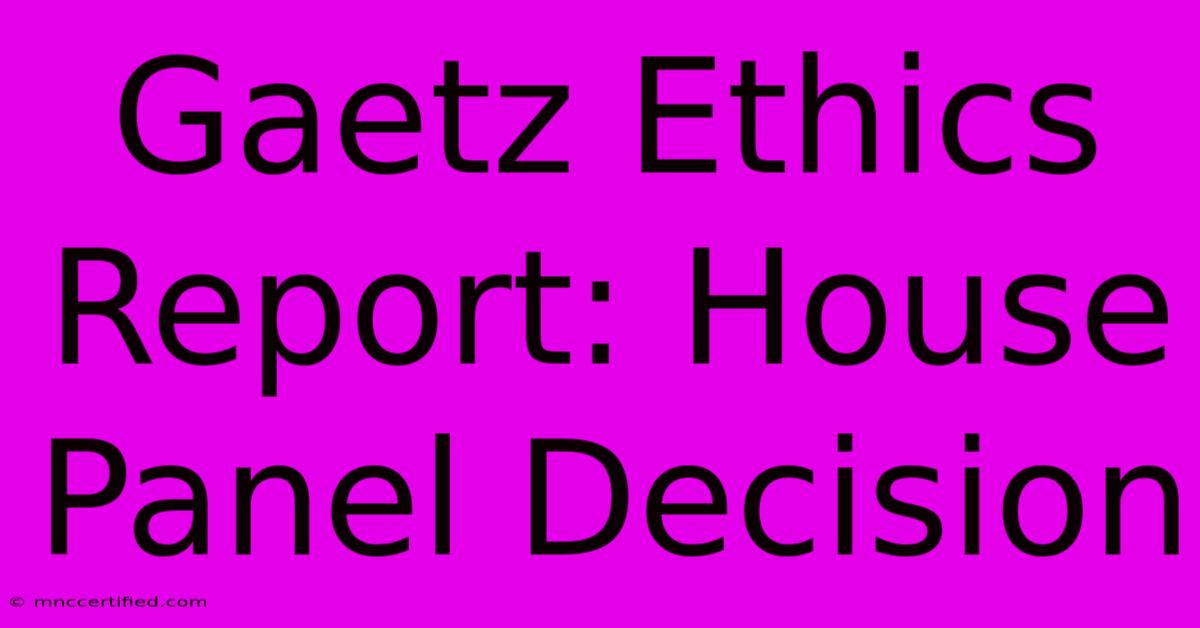Gaetz Ethics Report: House Panel Decision

Table of Contents
Gaetz Ethics Report: House Panel Decision - What We Know
The House Ethics Committee's decision regarding Rep. Matt Gaetz's conduct has been highly anticipated, generating significant media coverage and public interest. This article will break down the key findings, the process, and the potential implications of the panel's decision. We'll delve into the accusations, the investigation, and what this means for the future of the Congressman and the political landscape.
The Accusations Against Rep. Gaetz
Rep. Matt Gaetz, a Republican representing Florida's 1st congressional district, faced a multitude of serious allegations. These accusations, investigated by the House Ethics Committee, included claims of sexual misconduct, campaign finance violations, and potential abuse of power. The specifics of these accusations were detailed in various media reports and were the focus of the Ethics Committee's inquiry. It's crucial to remember that these are allegations, and the investigation aimed to determine their validity.
The House Ethics Committee Investigation
The House Ethics Committee's investigation involved a thorough review of evidence, including interviews with witnesses, examination of financial records, and analysis of communications. The process, while often opaque, adheres to established procedures designed to ensure fairness and due process. The length of the investigation underscored the complexity and sensitivity of the allegations. The Committee's findings, however, were not released to the public until recently.
The Committee's Decision and Its Significance
The House Ethics Committee ultimately released their report detailing their findings on Rep. Gaetz's conduct. This report holds significant weight, influencing public perception of the Congressman and potentially impacting his political career. The decision, whatever it may be – whether to exonerate him, issue a reprimand, or pursue further action – will have repercussions within the Republican party and the broader political sphere. Understanding the nuances of the Committee's decision and its rationale is crucial for grasping its wider impact.
Public Reaction and Political Fallout
The House Ethics Committee's decision will undoubtedly spark a wave of public reaction and political fallout. Depending on the outcome, we can expect significant media coverage, public debate, and potential political consequences for Rep. Gaetz and the Republican party. The implications of the report may extend beyond the immediate political sphere, impacting public trust in elected officials and the integrity of the political process.
Potential Future Actions and Legal Ramifications
Following the House Ethics Committee's decision, several potential scenarios could unfold. Further legal investigations might be initiated at the state or federal level, depending on the severity of the findings. Constituents may demand accountability, while political opponents might utilize the findings for strategic advantage.
Conclusion: Understanding the Long-Term Implications
The House Ethics Committee's decision on the Gaetz ethics report represents a significant event with far-reaching implications. Beyond the immediate political consequences, this case highlights the importance of accountability and transparency within the political system. It underscores the crucial role of independent oversight bodies like the House Ethics Committee in maintaining the integrity of the legislative process. The long-term impact of this decision will undoubtedly continue to shape the political landscape for years to come.
Keywords: Gaetz Ethics Report, House Ethics Committee, Rep. Matt Gaetz, sexual misconduct, campaign finance violations, abuse of power, investigation, political fallout, House of Representatives, Republican party, Florida, ethics investigation, accountability, transparency
Note: This article provides a general overview and analysis. For specific details regarding the House Ethics Committee's decision, please refer to official sources and reporting. This content is for informational purposes only and does not constitute legal advice.

Thank you for visiting our website wich cover about Gaetz Ethics Report: House Panel Decision. We hope the information provided has been useful to you. Feel free to contact us if you have any questions or need further assistance. See you next time and dont miss to bookmark.
Featured Posts
-
Another Rate Cut Fewer To Come
Dec 19, 2024
-
Keely Hodgkinson 2024 Sports Star
Dec 19, 2024
-
First Ever Disney Bbc Studios Collaboration
Dec 19, 2024
-
College Basketball California Vs Unlv
Dec 19, 2024
-
Scotlands First Body Double Jailed
Dec 19, 2024